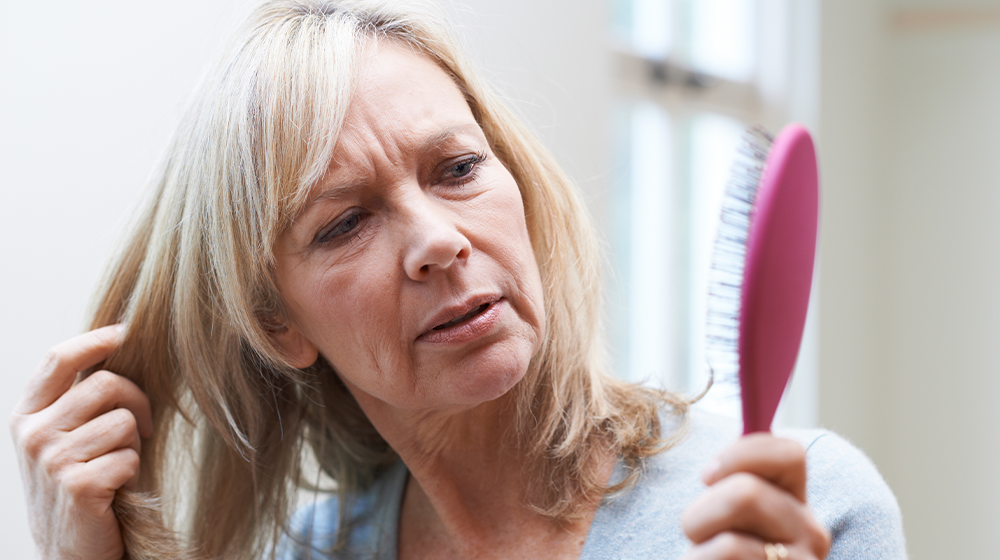Hair loss can be a symptom that indicates other health problems yet tends to be ignored. Diabetes, a condition that characterizes excess blood sugar, has been associated with hair loss. This article reviews diabetes and hair loss and gives an explanation of how diabetes can cause hair loss.
RELATED: Which Vitamin Deficiency Causes Hair Loss
Learn About Diabetes and Its Role in Hair Loss
Diabetes and hair loss are the two common health conditions that affect many people. Learning about diabetes and how it affects hair loss can help find appropriate treatments in the long run.
Understanding Diabetes and Hair Loss
Although losing hair is expected, as hair falls when it reaches its final stage of the growth cycle, excessive hair loss that causes hairs to fall in patches is an indicator of a health problem. Besides other common causes of hair loss, such as changes in hormones or stress, diabetes might be another factor that affects the normal hair growth cycle, leading to excess hair loss.
The average hair growth cycle includes three phases: anagen, catagen, and telogen. These phases are characterized by the time when hair protrudes from the hair follicles until it is shed. When the hair reaches the telogen phase, it ends its cycle and falls from the scalp. Nevertheless, any disruption to the hair growth cycle might cause hair to fall ahead of time or at a greater rate than usual.
Diabetes is a health condition characterized by the failure of the body to use insulin effectively, resulting in excessive blood sugar. Nutrients from food consumption are broken down into sugar and released into the bloodstream. The blood sugar is then transferred into the body’s cells by insulin as energy. Individuals who cannot produce sufficient insulin nor use insulin effectively accumulate excessive blood sugar in the bloodstream, consequently contracting diabetes.
Can Diabetes Cause Hair Loss?
Diabetes can cause hair loss due to poor oxygen and nutrient circulation to maintain a normal hair growth cycle. As mentioned above, diabetes causes sugar to build up at an excess level in the bloodstream. This excessive sugar subsequently damages various organs in the body, including the blood vessels. This vascular impairment leads to poor oxygen and nutrient circulation.
According to research on hair loss involving over 5000 women, type 2 diabetes was associated with susceptibility to central-scalp hair loss in black women. Further, there were 850 cases of severe hair loss reported in the follow-up period. The research concluded that individuals with type 2 diabetes should be strictly supervised so that doctors can offer optimal treatments for central-scalp hair loss.
Besides hair loss, diabetes can also cause hair thinning, fragility, sparsity, or a slower hair growth rate due to the disrupted hair cycle. The amount of hair loss depends on the level of oxygen and nutrient insufficiency. Nonetheless, although diabetes can damage the hair follicles and causes the hair to fall, the disease does not eliminate hair growth. The hair follicles that have shed hair previously can still grow new hair, yet at a slower rate.
Treatments for Hair Loss From Diabetes
Managing Blood Sugar
The most radical approach to treating hair loss due to diabetes is managing your blood sugars at an average level. If your blood sugar level is less than 140 mg/dL (milligrams per deciliter), it means your blood sugar is regular. On the other hand, if it is over 200 mg/dL, it indicates diabetes. Because too much blood sugar is associated with inadequate oxygen and nutrients for the regular hair growth cycle to occur, controlling your blood sugar can eliminate excess hair loss.
Medications

Several medications can help with hair loss due to diabetes. Minoxidil (Rogaine) is a topical drug that can be applied directly on the scalp and areas where hair loss occurs. Both males and females can be prescribed minoxidil. Another medication to treat hair loss is oral finasteride (Propecia). However, finasteride has not been approved for female use. Please consult your doctor before using any medications above to receive the maximum benefits and avoid any side effects.
RELATED: Chronic Telogen Effluvium Causes & Treatment
How Do You Prevent Hair Loss From Diabetes?
Changes in Diet
Eating a balanced diet can also help with managing diabetes and preventing hair loss. Foods that you can incorporate into your diet include those rich in iron, zinc, biotin, vitamin D, and fiber. You can also use supplements under medical supervision to make up for the nutrient deficiencies if food intake alone cannot provide you with sufficient nutrients. Please consult your doctor for a comprehensive medical exam to determine whether you have any deficiencies.
Lifestyle Modifications
While exercise may not prevent hair loss, it can improve the body’s blood circulation, leading to a normal hair growth cycle. Regular exercise can enhance blood flow to various body regions, including hair follicles. It can also aid in managing blood sugar levels by burning blood sugar to provide the body with energy. The amount and level of exercise depend on each individual, so ensure that you work out appropriately.
Hair loss can be distressing, especially when you experience it with another health condition. However, please remember that you can stop, reverse, and even prevent the symptoms of diabetes, including hair loss, by medications, diet, and lifestyle modifications.
If you have questions about diabetes and hair loss or any health problems discussed here, connect with us and learn more.
At Peak Human, our team of healthcare professionals is dedicated to helping you reach your ‘peak’ health with a custom whole-person approach. Using the most cutting-edge, science-backed biohacking and aesthetic tools, technologies, and treatments available today, we help you achieve the highest physical/cognitive performance state, leading to an improved overall quality of life.
For questions or to book an appointment, don’t hesitate to contact us. Get personalized support and insight from expert physicians.
UP NEXT:
- What Is the Role of GHK-Cu to Keeping Healthy Skin & Hair?
- How To Get Healthier Hair: 6 Steps You Need To Follow
- 7 Significant Health Benefits of CoQ10 (Coenzyme Q10)






